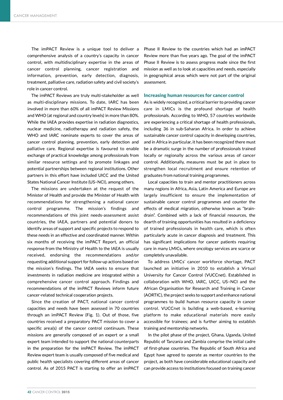
The imPACT Review is a unique tool to deliver a
comprehensive analysis of a country's capacity in cancer
control, with multidisciplinary expertise in the areas of
cancer control planning, cancer registration and
information, prevention, early detection, diagnosis,
treatment, palliative care, radiation safety and civil society's
role in cancer control.
The imPACT Reviews are truly multi-stakeholder as well
as multi-disciplinary missions. To date, IARC has been
involved in more than 60% of all imPACT Review Missions
and WHO (at regional and country levels) in more than 80%.
While the IAEA provides expertise in radiation diagnostics,
nuclear medicine, radiotherapy and radiation safety, the
WHO and IARC nominate experts to cover the areas of
cancer control planning, prevention, early detection and
palliative care. Regional expertise is favoured to enable
exchange of practical knowledge among professionals from
similar resource settings and to promote linkages and
potential partnerships between regional institutions. Other
partners in this effort have included UICC and the United
States National Cancer Institute (US-NCI), among others.
The missions are undertaken at the request of the
Minister of Health and provide the Minister of Health with
recommendations for strengthening a national cancer
control programme. The mission's findings and
recommendations of this joint needs-assessment assist
countries, the IAEA, partners and potential donors to
identify areas of support and specific projects to respond to
these needs in an effective and coordinated manner. Within
six months of receiving the imPACT Report, an official
response from the Ministry of Health to the IAEA is usually
received, endorsing the recommendations and/or
requesting additional support for follow-up actions based on
the mission's findings. The IAEA seeks to ensure that
investments in radiation medicine are integrated within a
comprehensive cancer control approach. Findings and
recommendations of the imPACT Reviews inform future
cancer-related technical cooperation projects.
Since the creation of PACT, national cancer control
capacities and needs have been assessed in 70 countries
through an imPACT Review (Fig. 1). Out of those, five
countries received a preparatory PACT mission to cover a
specific area(s) of the cancer control continuum. These
missions are generally composed of an expert or a small
expert team intended to support the national counterparts
in the preparation for the imPACT Review. The imPACT
Review expert team is usually composed of five medical and
public health specialists covering different areas of cancer
control. As of 2015 PACT is starting to offer an imPACT
Phase II Review to the countries which had an imPACT
Review more than five years ago. The goal of the imPACT
Phase II Review is to assess progress made since the first
mission as well as to look at capacities and needs, especially
in geographical areas which were not part of the original
assessment.
Increasing human resources for cancer control
As is widely recognized, a critical barrier to providing cancer
care in LMICs is the profound shortage of health
professionals. According to WHO, 57 countries worldwide
are experiencing a critical shortage of health professionals,
including 36 in sub-Saharan Africa. In order to achieve
sustainable cancer control capacity in developing countries,
and in Africa in particular, it has been recognized there must
be a dramatic surge in the number of professionals trained
locally or regionally across the various areas of cancer
control. Additionally, measures must be put in place to
strengthen local recruitment and ensure retention of
graduates from national training programmes.
Local capacities to train and mentor practitioners across
many regions in Africa, Asia, Latin America and Europe are
largely insufficient to ensure the implementation of
sustainable cancer control programmes and counter the
effects of medical migration, otherwise known as "braindrain".
Combined with a lack of financial resources, the
dearth of training opportunities has resulted in a deficiency
of trained professionals in health care, which is often
particularly acute in cancer diagnosis and treatment. This
has significant implications for cancer patients requiring
care in many LMICs, where oncology services are scarce or
completely unavailable.
To address LMICs' cancer workforce shortage, PACT
launched an initiative in 2010 to establish a Virtual
University for Cancer Control (VUCCnet). Established in
collaboration with WHO, IARC, UICC, US-NCI and the
African Organisation for Research and Training in Cancer
(AORTIC), the project seeks to support and enhance national
programmes to build human resource capacity in cancer
control. VUCCnet is building a web-based, e-learning
platform to make educational materials more easily
accessible for trainees; and is further aiming to establish
training and mentorship networks.
In the pilot phase of the project, Ghana, Uganda, United
Republic of Tanzania and Zambia comprise the initial cadre
of first-phase countries. The Republic of South Africa and
Egypt have agreed to operate as mentor countries to the
project, as both have considerable educational capacity and
can provide access to institutions focused on training cancer
CANCER MANAGEMENT
42 CANCER CONTROL 2015